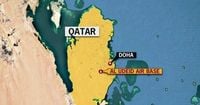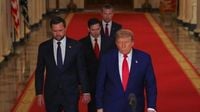On Monday, June 23, 2025, tensions in the Middle East escalated as Iran launched a missile attack on Al Udeid Air Base in Qatar, the largest U.S. military installation in the region. This strike was a direct retaliation to U.S. airstrikes on Iran's underground nuclear facilities over the preceding weekend, marking a critical juncture in the ongoing Iran-Israel conflict that began earlier that month.
Al Udeid Air Base, situated just 190 kilometers (about 120 miles) south of Iran across the Persian Gulf, is a sprawling 24-hectare military complex located in the desert outskirts of Doha, Qatar’s capital. Established in 1996, it serves as the forward headquarters for U.S. Central Command, overseeing military operations stretching from Egypt in the west to Kazakhstan in the east. The base hosts approximately 10,000 troops and accommodates forces from the U.S. Air Force, Qatar Emiri Air Force, the United Kingdom’s Royal Air Force, and other allies.
Qatar has invested heavily in the base’s infrastructure, spending over $8 billion to upgrade its facilities, ensuring it remains a strategic hub for rapid deployment and force projection. The base has been pivotal in past military campaigns in Iraq and Afghanistan and has supported humanitarian missions such as the 2021 evacuation of Kabul.
In the hours leading up to the missile attack, Qatar’s Foreign Ministry took precautionary measures by temporarily closing its airspace, citing regional developments and credible threats. The U.S. Embassy in Doha also issued a shelter-in-place order for American citizens, reflecting the gravity of the situation. Satellite imagery revealed that the U.S. had already moved most of its aircraft from the base between June 5 and June 19, a strategic step to protect assets ahead of anticipated hostilities. Additionally, U.S. Navy vessels were repositioned from Bahrain’s port as part of broader force protection efforts.
Iran’s missile strike involved the launch of 14 short-range and medium-range ballistic missiles targeting Al Udeid. Qatari air defenses successfully intercepted the majority of these missiles, with only one missile striking a building near the base. Fortunately, there were no casualties or significant damage to military infrastructure reported. A U.S. defense official confirmed that, despite the attack, no American personnel were harmed.
President Donald Trump responded swiftly, characterizing the missile barrage as a "very weak response" and expressing gratitude for Iran’s advance warning, which he said prevented loss of life. On his Truth Social platform, Trump stated, "I want to thank Iran for giving us early notice, which made it possible for no lives to be lost, and nobody to be injured." He also expressed hope for peace and harmony in the region, urging both Iran and Israel to seek a ceasefire.
Iran’s Supreme Leader, Ayatollah Ali Khamenei, posted an image of a burning American flag on X, declaring, "We will not surrender to anyone's aggression. This is the logic of the Iranian nation." His adviser, Ali Akbar Velayati, had earlier warned that U.S. bases used in the region could be targeted in retaliation for the strikes on Iran’s nuclear sites. The Islamic Revolutionary Guard Corps (IRGC) described the missile attack as "devastating and powerful," underscoring the base’s strategic importance as the largest U.S. military asset in West Asia.
Despite the military posturing, Iran’s Supreme National Security Council sought to project a message of restraint, stating that the number of missiles fired matched the number of bombs dropped by the U.S. in its recent offensive. They emphasized that the attack was carefully targeted to avoid harm to Qatar’s population, highlighting the friendly diplomatic relations between Iran and Qatar.
Qatar, however, condemned the missile strike as a "flagrant violation" of its sovereignty and international law. Foreign Ministry spokesman Majed Al-Ansari called for a genuine meeting and clear stance in response to the aggression. Neighboring Gulf states including Bahrain, the United Arab Emirates, Saudi Arabia, Kuwait, and Iraq also condemned the attack. Qatar swiftly reopened its airspace about four hours after the missile strike, and the U.S. Embassy lifted its shelter-in-place order, resuming consular services the following day.
The attack on Al Udeid was the only confirmed missile strike on U.S. facilities in the region, although sirens and airspace closures were reported in Iraq, Bahrain, the UAE, and Kuwait. The U.S. and Qatar had been forewarned of the attack through diplomatic channels, allowing for the effective interception of the missiles and safeguarding of personnel.
Meanwhile, Israel intensified its own military campaign against Iran, launching its most extensive wave of strikes on Tehran to date. Notably, Israel targeted Evin Prison, notorious for housing political prisoners and foreign detainees, as well as Revolutionary Guard command centers linked to internal security. These actions marked a broadening of Israel’s offensive beyond nuclear and military sites to include key pillars of Iran’s ruling establishment.
The ongoing conflict has had widespread repercussions, including a significant displacement of Tehran’s population and volatility in global oil markets. Despite Iran’s threats to disrupt Gulf oil shipments, prices fell 7% amid trader skepticism about the likelihood of supply interruptions.
Amid these escalating hostilities, U.S. officials have signaled a desire to avoid a wider war. A White House official told Axios that President Trump’s goal was to end the conflict and that he planned to communicate this intention to Israeli Prime Minister Benjamin Netanyahu. Trump himself announced a complete ceasefire between Israel and Iran on June 23, potentially bringing an end to the 12-day war that had caused millions to flee Tehran and raised fears of regional escalation.
Public sentiment in the U.S. reflected anxiety over the conflict, as revealed by a Reuters/Ipsos poll conducted during the crisis. Meanwhile, discussions within Iran reportedly continue about succession plans for the aging Supreme Leader Khamenei, adding another layer of complexity to the volatile situation.
The missile attack on Al Udeid Air Base thus stands as a stark reminder of the precarious balance in the Middle East. It highlights the strategic significance of Qatar as a host to critical U.S. military operations and the delicate diplomatic ties that underpin regional stability. With all sides signaling both readiness and restraint, the world watches closely, hoping the recent ceasefire will hold and that peace can be restored to a region long plagued by conflict.


